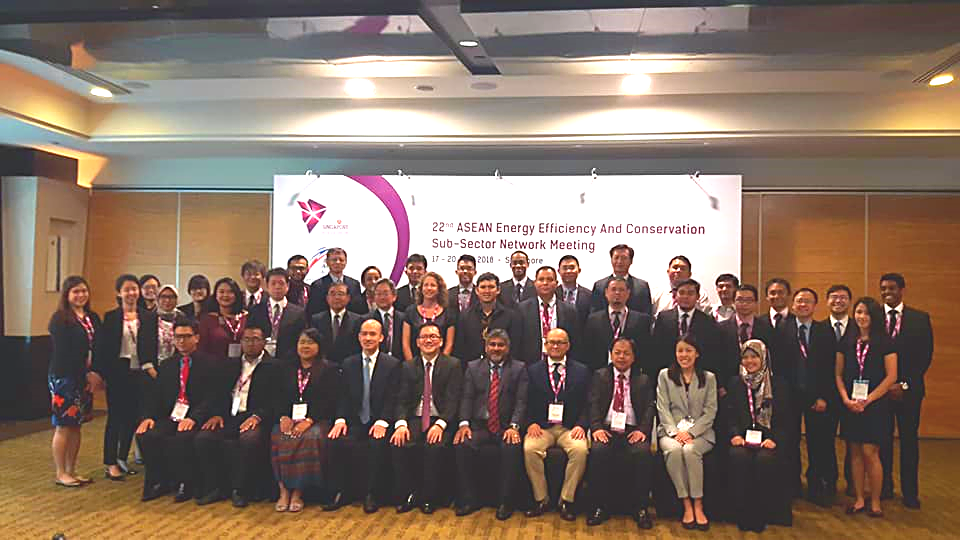Menu
The 22nd Meeting of the ASEAN Energy Efficiency and Conservation Sub-sector Network (EE&C-SSN) was held on 19-20 April 2018 in Singapore. Hosted by the Energy Market Authority (EMA), the Meeting was organised along with the Energy Efficiency and Conservation Evaluation Meetings of the Board of Judges for the (i) ASEAN Energy Awards (AEA) 2018 on 17-18 April 2018 and (ii) ASEAN-German Energy Programme (AGEP) Consultation Meeting on 18 April 2018.

The Meeting was attended by delegates from eight ASEAN Member States (AMS); Brunei Darussalam, Indonesia, Lao PDR, Malaysia, Myanmar, the Philippines, Singapore and Thailand. The representatives of various dialogue partners (DPs) and international organisation (IOs) also attended the Meeting; the Energy Conservation Center Japan (ECCJ), the Deutsche Gesellschaft für Internationale Zusammenarbeit (GIZ), Clean Air Asia, Japan Business Alliance for Smart Energy Worldwide (JASE-W), International Copper Association (ICA) and the United Nations Environment Programme (UNEP). They presented updates of their cooperation with AMS and ASEAN Centre for Energy (ACE). In addition, representatives from the ASEAN Secretariat (ASEC) and the ASEAN Centre for Energy (ACE) were also present.
The meeting considered and agreed on the accomplishments of the 2017 activities and work plan for 2018-2019. Some of the successful programmes such as AGEP, ASEAN-Japan Energy Efficiency Partnership (AJEEP), Energy Conservation Workshop under AJEEP, ASEAN SHINE Lighting Phase I, ASEAN+3 Mitigation Cooperation Programme, and the ASEAN Energy Awards EE&C were discussed in the meeting.
In line with the goals of ASEAN Plan of Action for Energy Cooperation (APAEC) 2016-2025, the meeting also discussed the progress toward reducing 20% energy intensity by 2020, based on 2005 levels. According to ACE’s statistics, ASEAN has successfully achieved an energy intensity reduction by 18.3% in 2015, compared to 2005 levels. In order to further meet the target, the meeting called for a unified action to foster collaboration on innovative solutions, to continue information sharing on best practices, capacity building, better business models and promotion of other alternative and emerging energy-efficient technologies.
The AMS expected future collaborations with DPs/IOs to enhance the EE&C programme in the region. The EE&C-SSN Focal Points also agreed to bring forward the new initiatives among others to conduct feasibility study and capacity building in fuel economy, to harmonise standards (ISO 16358) and to strengthen market verification and enforcement capability. The set of recommendations will be reported to the Senior Officials Meeting on Energy and ASEAN Ministers on Energy Meeting later this year to get their endorsements. (RJPS)
